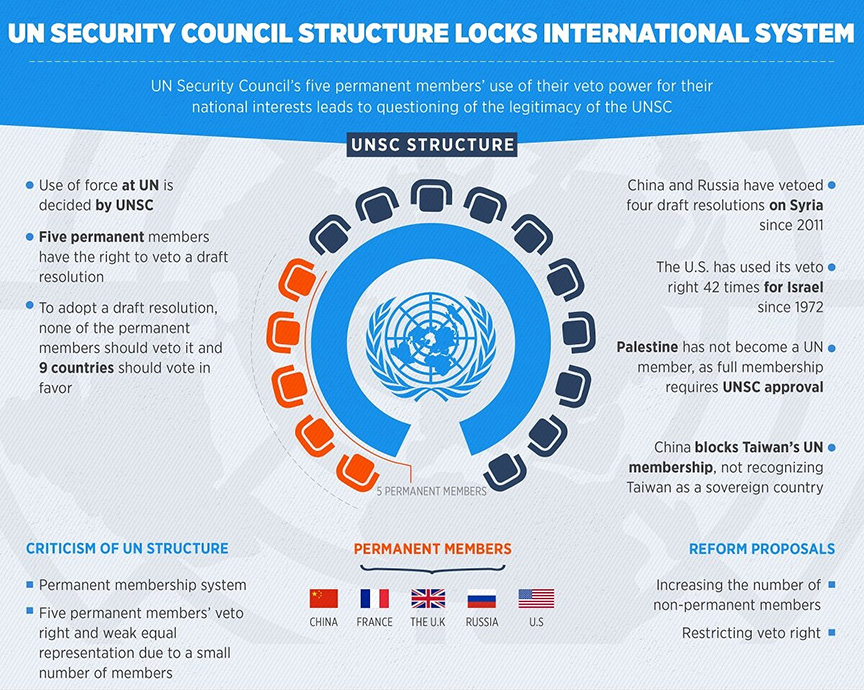India’s Case of Permanent Seat in UNSC
Why in News
In the past, the Obama and Trump administrations had supported a permanent seat for India on the United Nations Security Council (UNSC). However, the recent statements by the State Department under the new US President Joe Biden, reflects an ambiguous or half-hearted view on this issue.
Key Points
- Highlights of the Recent Viewpoint:
- The US supports a reformed Security Council that is representative, that is effective, and that is relevant.
- However, the US offers qualified support for building a consensus for enlargement of the UNSC – in terms of permanent and non-permanent members.
- The US would not support an expansion of the veto, which is currently exercised by five permanent members (P-5): China, France, Russia, the UK and the US.
- Also, the US's Ambassador to the UN, had refrained from saying the US supported India and other members of the G4 (Japan, Germany and Brazil) for a permanent UNSC seat.
- It cited the regional disagreements by the Uniting for Consensus (UFC) group – Pakistan, South Korea, Italy and Argentina – which opposes the G4 plan.
- The US supports a reformed Security Council that is representative, that is effective, and that is relevant.
- Need for UNSC Reforms:
- Undemocratic Nature of UNSC: Barring two regions (North America and Europe), other regions are either underrepresented (like Asia) or not represented at all (Africa, Latin America and the Small Island developing states).
- Misuse of Veto Power: The veto power is used by P-5 countries to serve the strategic interest of themselves and their allies.
- For example, the United States has casted a veto on Council resolutions 16 times, to support its ally Israel, concerning Israeli-Palestinian conflict.
- Lack of Global Governance: There are no regulatory mechanisms for global commons like the Internet, Space, High Seas (beyond one’s EEZ-exclusive economic zone).
- Also, there is no unanimity on how to deal with global issues like terrorism, climate change, cybersecurity and public health (as seen in the current pandemic).
- Due to all these factors, the former UN Secretary-General Kofi Annan said that the Security Council must either reform or risk becoming increasingly irrelevant.
- Case for Permanent Membership of India in UNSC:
- India’s Historic Association with the UN System: India is the founding member of the UN.
- India, till now has been elected for eight terms for a two-year non-permanent member seat.
- Most significantly, India has almost twice the number of peacekeepers deployed on the ground than by P5 countries.
- India’s Intrinsic Value: India being the largest democracy and second-most populous country (soon to become most populous) in the world, are the primary reasons for it to be granted permanent membership in UNSC.
- Also, India is one of the largest economies and fastest-growing economies of the world.
- India’s Geopolitical Footprint: India's acquired status of a Nuclear Weapons State (NWS) in May 1998 also makes India a natural claimant as a permanent member similar to the existing permanent members who are all Nuclear Weapon States.
- Also, India has been inducted in various export control regimes like MTCR, Wassenaar arrangement, etc.
- India’s international profile and capabilities rise due to its ever-expanding global footprint in diverse areas like politics, sustainable development, economics, and culture and science and technology.
- Representing the developing World: India is the undisputed leader of the Third world countries, as reflected by its leadership role in the Non-Aligned Movement.
- India’s Historic Association with the UN System: India is the founding member of the UN.
Note
- In the past, India was offered to join the UNSC by both the superpowers, the US and the then Soviet Union in 1950 and in 1955 respectively.
- However, India denied the offer due to Cold war politics in that era.
- India is currently (in 2021 and 2022) a non-permanent member of the UNSC and is president for the month of August.
- RoadBlocks in India’s Bid for Permanent Membership:
- It is argued by critics that India has still not signed the Nuclear Non-Proliferation Treaty (NPT) and also refused to sign the Comprehensive Nuclear-Test-Ban Treaty in 1996.
- China, which has veto power in the UNSC being one of its five permanent members, has been stonewalling India's efforts to become a permanent member.
- Though India is a bright spot in the global economy and its macroeconomic fundamentals are stable, it shows poor performance in many socio-economic indicators like the Human Development Index.
- India’s capacity to project its military power beyond the Indian Ocean region is still to be tested. Further, India heavily relies on weaponry imports from US and Russia for its military requirements.
